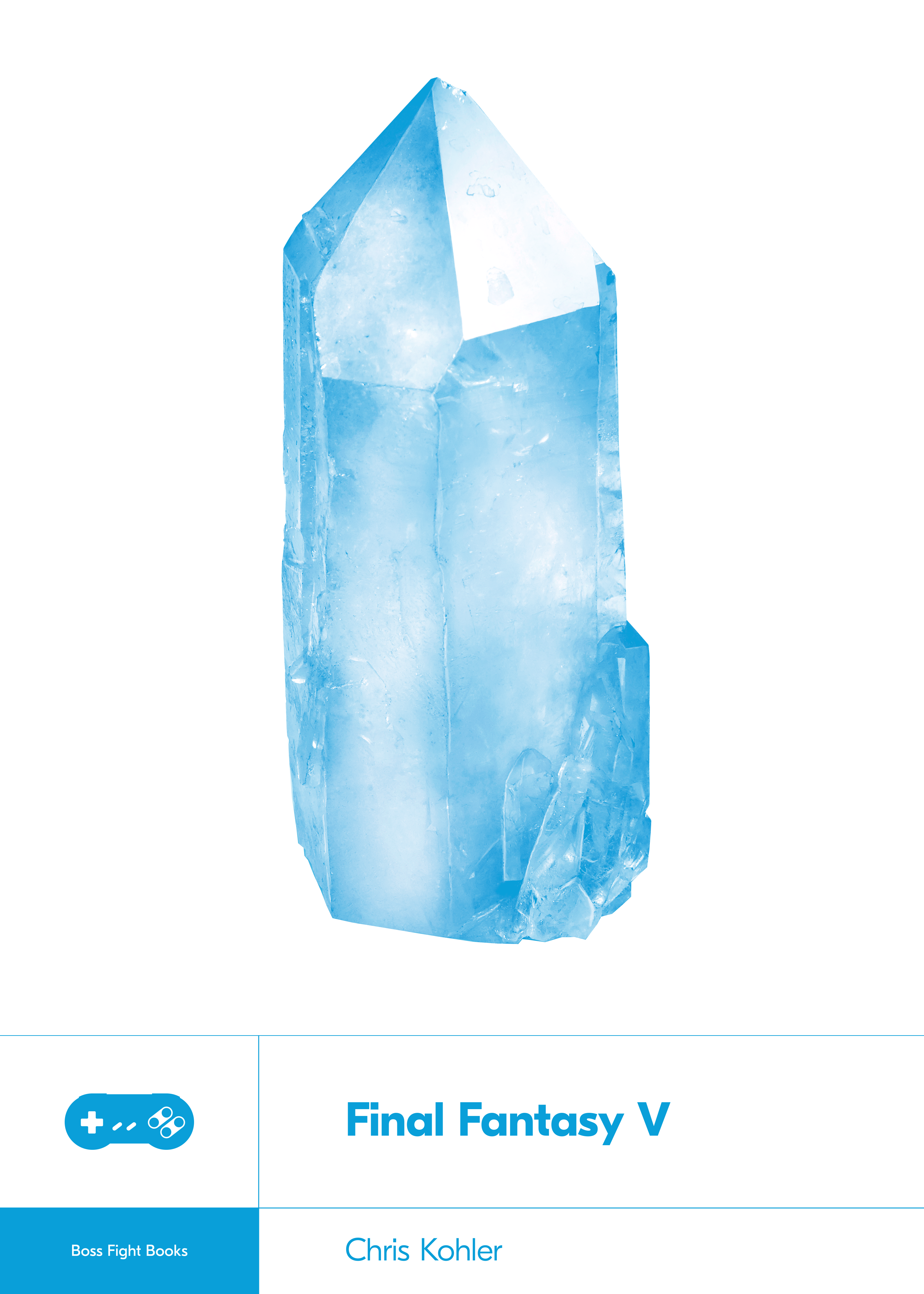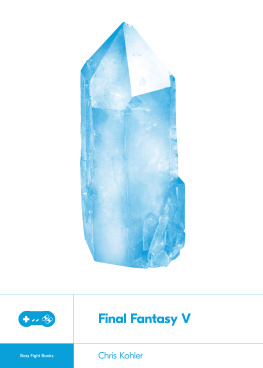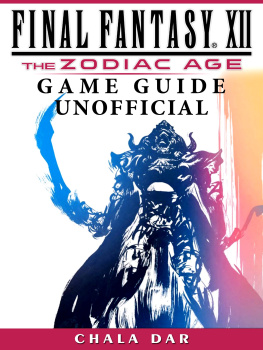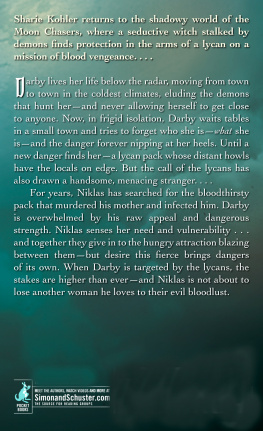Kohler - Final Fantasy V
Here you can read online Kohler - Final Fantasy V full text of the book (entire story) in english for free. Download pdf and epub, get meaning, cover and reviews about this ebook. City: Gardena, year: 2017, publisher: Boss Fight Books;Scb, genre: Romance novel. Description of the work, (preface) as well as reviews are available. Best literature library LitArk.com created for fans of good reading and offers a wide selection of genres:
Romance novel
Science fiction
Adventure
Detective
Science
History
Home and family
Prose
Art
Politics
Computer
Non-fiction
Religion
Business
Children
Humor
Choose a favorite category and find really read worthwhile books. Enjoy immersion in the world of imagination, feel the emotions of the characters or learn something new for yourself, make an fascinating discovery.
- Book:Final Fantasy V
- Author:
- Publisher:Boss Fight Books;Scb
- Genre:
- Year:2017
- City:Gardena
- Rating:3 / 5
- Favourites:Add to favourites
- Your mark:
- 60
- 1
- 2
- 3
- 4
- 5
Final Fantasy V: summary, description and annotation
We offer to read an annotation, description, summary or preface (depends on what the author of the book "Final Fantasy V" wrote himself). If you haven't found the necessary information about the book — write in the comments, we will try to find it.
Final Fantasy V — read online for free the complete book (whole text) full work
Below is the text of the book, divided by pages. System saving the place of the last page read, allows you to conveniently read the book "Final Fantasy V" online for free, without having to search again every time where you left off. Put a bookmark, and you can go to the page where you finished reading at any time.
Font size:
Interval:
Bookmark:

In Japan, the word is always haunted by negative connotations. That belief is not common in America... In their yearning for Japan, they earnestly boast of being otaku.
Toshio Okada, 1995

Japa n is another world , separate from your own. It is not a place to which you can travel, but there are portals through which you can see it. These portals are imperfect; the image they return is distorted and superficial. It is your lifes work to search for these portals, but there is only so much you can do at fourteen, without much ability to look for them outside your small town. But they still exist, even here.
One is in the Connecticut Post shopping mall in the city you were born: Enter through the ground floor, swing a left past the hot pretzels filling the aisle with their unmistakable cloying aroma that is the universal scent of mall, past the arcade (itself the fuzziest of portals) and inside the comic book store, strategically placed at this well-trafficked intersection of video competition and warm mustard. It is 1995, and so the walls of this store are still papered with a plethora of foil-embossed, poly-bagged special editions of superhero comics, with their promise of being worth millions of dollars one unspecified day in the future.
Decades from now, one wall of every suburban Barnes & Noble will be devoted to a stunning array of Japanese manga in English translation, spanning genres from action to horror to romance to biography. Today, this is an impossible dream, and the portal to Japan that lives in this comic store is about one foot wide, and there are barely enough products to fill even this tiny shelf. These comics, with their inscrutable titles like Urusei Yatsura , are printed in black and white and cost twice as much money as their full-color American counterparts. VHS tapes of anime , too, are absurdly priced at $50 for barely an hour of animated content. You do not have $50, and YouTube is ten years away.
And yet, beckoning from the covers of these pricey treasures, come the intoxicating promises of stories and images and sensibilities that are nowhere to be found in any of the inexpensive domestic drafts that make up the other 99 percent of the comic store. A round-faced girl with green hair and tiny demon horns, barely fitting into a minuscule tiger-print bikini, beams flirtatiously at you. This is Japan, as far as you know. It is transfixing. America, its superheroes, and its pretzels and its Comics Code Authority, might well have crumbled away around you, for all you know in this moment.
I dont know when I became aware that all of the video games I loved as a kid were coming from Japan, but it was well before Id read my first manga, watched my first anime. I can certainly tell you of the first time I realized that something was being kept from me.
For the Nintendo Entertainment System-owning American kid of the 1980s, Nintendo Power was the Bible. Nintendos in-house monthly magazine was not just holy text but also holy doctrine: We worshippers were offered an understanding of the world of Nintendo on a strictly need-to-know basis, and other sources were to be regarded with skepticism. Nintendo would pass to you the approved commandments, at the appointed hour, and never anything else.
One day in what must have been 1989, a third-grade classmate showed up with a video game magazine that was not Nintendo Power . I was only vaguely aware that these even existed, and I dont remember which magazine it was, although I think it may have been the first issue of GamePro . What I do remember is that he said it had pictures of Super Mario Bros. 3 .
Bullshit , I thought, just as I had when another classmate said his uncle worked at Sega and had the unreleased 4D Glasses for the Master System. No way did this kids magazine have pictures of Super Mario Bros. 3 when Super Mario Bros. 2 had only just come out! But I looked at the two-page spread and my jaw dropped. There was Marios next adventure, and the article said that it was already available for some game system in Japan called the Famicom. It was in a magazine, so it must be true: Super Mario Bros. 3 existed. Lucky-ass Japanese kids were playing it right now. And had I stayed in my Nintendo Power bubble, Id have been none the wiser. These other magazines had some pretty ugly layouts and sloppy writing compared to Nintendo Power , and Id come to learn that they often dealt in some sketchy rumors. But with that rawness came the unvarnished honesty of a staff that was not employed by the same company it reported on. They werent keeping anything from me.
Poring over more issues of magazines like Electronic Gaming Monthly as the years went on, I slowly became aware that not only did Japan get the cool games first , sometimes Japan got games that we never got at all. Eventually those feelings of childhood jealousy turned into teenaged resentment: Why didnt we get these games? Why were we this second-rate video game dumping ground? Why did America suck so hard? Why couldnt I have been born in Japan?
And in 1995, the biggest perceived injustice, the game we should have gotten, the game I couldnt believe wasnt coming to America, was Final Fantasy V.
It should come as no surprise that a kid who was reading whatever manga he could possibly get his hands on was also deep into Japanese role-playing games. JRPGs, at that moment, represented the pinnacle of gaming for me. Japanese game developers had taken the tabletop swords-and-sorcery, hit-points-and-mana gameplay of Dungeons & Dragons and brought it into video games with their own unique flair. Final Fantasy in particular leaned hard into the storytelling aspect, crafting epic stories with symphonic soundtracks that took players on journeys that lasted dozens if not hundreds of hours. For a teen with no money and lots of free time, this was perfect.
Final Fantasy IV and Final Fantasy VI (originally released in America as Final Fantasy II and Final Fantasy III respectively) werent just two of my favorite Super Nintendo games. They showed me things I didnt think video games could even do: Ambitious storytelling with compelling characters. Rich scores that made it sound like a tiny orchestra was trapped inside my SNES. Love. Humor. Death.
And there was a third game in that Super Famicom trilogy, the middle one, that was supposed to come out here. But it never showed up.
I didnt know the first thing about Final Fantasy V . But I knew we got hosed. Screwed over. And I wasnt going to let it slip away. This is how Final Fantasy V became the first game I ever imported from Japan. I didnt know the language, but that wasnt going to stop me. Soon, Id find that others had the exact same idea.
Eventually, Final Fantasy V did get released in America: Seven years after its initial release, it was ported to Sonys PlayStation. But it was a game out of time, stuck with a pixelated, 2D, 16-bit aesthetic before pixels became cool again. A sloppy, rushed translation was the final nail in the coffin. In Japan, Final Fantasy V was a colossal hit, and is fondly remembered there today as one of the greatest games of the Super Famicom era. In America, its considered the black sheep of the series, its rep totally ruined by a late, botched release.
In other words: We got a raw deal... but Final Fantasy V got a worse one. Its no black sheep. It might even be the best game in the whole series.
Recently, as an experiment, I put a copy of Final Fantasy V into a Super Nintendo to note how long the screen stayed black before any graphics appeared. It wasnt more than a second or two, but it was a deliberate second, one I believe was put there intentionally by the designers. They wanted the first thing you saw to be a black screen that lingered for just a moment.
Font size:
Interval:
Bookmark:
Similar books «Final Fantasy V»
Look at similar books to Final Fantasy V. We have selected literature similar in name and meaning in the hope of providing readers with more options to find new, interesting, not yet read works.
Discussion, reviews of the book Final Fantasy V and just readers' own opinions. Leave your comments, write what you think about the work, its meaning or the main characters. Specify what exactly you liked and what you didn't like, and why you think so.












